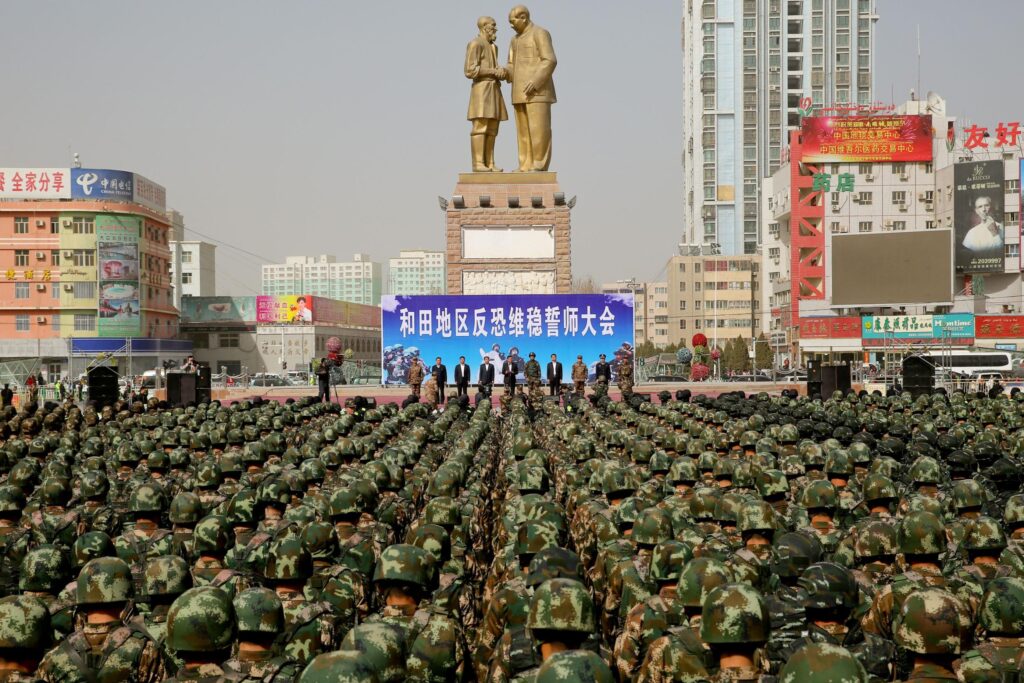
Photo courtesy of CNN
In the far west corner of China lies the territory of Xinjiang, which is three times the size of France and covers a vast expanse of deserts, mountains, and grasslands. This territory, home to more than one million Uighur Muslims, has been the center of numerous major human rights controversies.
Uighur Muslims in Xinjiang have been detained in “re-education” camps and are subject to indoctrination, torture, and forced labor by the Chinese government. Government officials have defended the camps’ policies, claiming that, by isolating the Uighurs, they are managing ethnic tensions, fighting terrorism, and reducing poverty. Yet, there is irrefutable evidence that the Uighur crackdown’s stated goal of protection is nothing more than a xenophobic facade. The Chinese government’s actions are a clear violation of human rights, and governments across the world should take a harder stance in opposition to the issue.
The Uighurs are a Turkic ethnic group originally from Central and East Asia who speak their own developed languages. In 1949, Uighurs made up roughly 76% of Xinjiang’s population, while Han Chinese made up 6%. By 2018, 40% of the population was Han Chinese and 51% were Uighur Muslims. The Chinese Communist Party (CCP) set up the Xinjiang Uighur autonomous region in 1955, following a Soviet model that provided minorities autonomy in their own affairs.
After the events of 9/11, the Chinese government defended the maintenance of the region and other Xinjiang policies by accrediting them to counterterrorism efforts. The government claimed that Xinjiang was vulnerable to foreign-influenced separatist movements that could undermine national security. There were sporadic clashes between Uighur rights movements and the local police in the 1990s and early 2000s. In 2009, a fight between Han and Uighur factory workers in the Guangdong Province resulted in the death of two Uighurs and triggered hundreds to take to the streets in Urumqi, Xinjiang’s capital. The fight devolved into a bloody riot that left 200 people dead.
In response, Chinese President Xi Jinping declared a people’s war on terror. According to the BBC, China has detained around a million Uighurs without trial, forcing these ethnic minorities to assimilate into Han Chinese civilization. Even outside of the over 350 detention camps that the Chinese government constructed to house the Uighur people, the millions of Uighurs living in the Xinjiang region live under constant surveillance, including facial recognition tracking, mobile phone monitoring, and even DNA tracking.
Powerful countries can use influential measures to apply pressure on the Chinese government. The U.S and its allies could unite in employing a combination of economic sanctions and embargoes.
The size and influence of the Chinese market has made other countries reluctant to criticize them, lest they lose potential market access. As such, states have turned a blind eye against the blatant human rights violations that China has committed. To combat this, like-minded allies should provide support to civil-service groups and promote access to independent media and information for the Chinese people. American allies should strive to engage with Chinese dissidents and activists without putting them in danger. This could include meeting with Chinese dissidents living in allied and partner countries, calling attention to the cases of unjustly imprisoned political activists and encouraging their release. This would not only pressure China to respond, but also shine a light on the human rights violations.
The United Nations could serve as an important mediator, clearly establishing the facts of the situation, which could spurr collective action. The U.N. response to the Xinjiang issue has been limited, compounded by the U.S.’s decision to leave the U.N. Human Rights Council in 2018. Beijing has taken advantage of the U.S.’s absence to further its influence on various countries. China increased its funding to the U.N. and secured top positions there. In October 2021, Beijing won a seat on the Human Rights Council, where it continues to drive its non-interference agenda that severely undermines the U.N. human rights system. However, if the U.N. could provide analysis on the CCP’s misconduct, in addition to continued reporting by U.N. experts, it could establish a commonly accepted set of facts on this situation.
Addressing the current Xinjiang situation will be fraught with tension and will require ongoing, collective action. Coordinated initiatives and statements will not only help diminish the risk of Chinese retaliation against individual countries but also lend a stronger voice to smaller countries. Elevating the voices of other nations and supporting them as they navigate this issue could help them come to a resolution that addresses the concerns of all parties.




